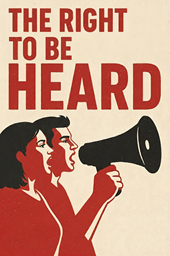by Ron Raskin

Every social group should have a basic right—the right to be heard. Whether it is entire nations represented by their governments abroad, or subgroups within a nation represented by political parties at home, each should be able to share its views in the court of public opinion—just as every individual has the right to speak in a court of law.
At a practical level, this means that any nation participating in an international free-speech agreement must be guaranteed proportional space in any outlet or platform that comments on its affairs. If a major media outlet reports on a country, that country must have the right to present its perspective—within the same outlet, on the same platform, and to the same audience. No more token lines like “we reached out for comment.” No more buried footnotes. Real representation.
In return, these outlets would gain access to publish on that nation’s platforms, ensuring mutual transparency and exchange. Only then can people see the world not as caricatures, but through each other’s eyes.
The same principle applies within national borders: international agreements are replaced by internal regulations, and nations are replaced by political parties.
So how would this work in practice? Below are some common Q&As. They are mostly framed in terms of nations, but the same logic can also be applied to political parties or coalition/oposition within a country:
Q: How can an outlet publish a piece that may not meet its own quality standards?
Every nation should have the right to publish its own articles on the same platform where it was discussed, for the same audience. Naturally, those articles must meet the platform’s quality standards. To ensure this, articles about a country appearing in top outlets—say, U.S. outlets discussing Israel—should be matched by pieces selected from Israel’s top outlets. This imposes some limits on what a government can present abroad, but it helps guarantee a sufficiently high level of quality.
Alternatively, each outlet could define and publish its own set of quality rules, with an independent body (such as a court) empowered to intervene if disputes arise.
Q: What are the conditions for a nation to have the right to be heard when a piece is published?
Two conditions must be met:
- The nation is directly mentioned or directly discussed.
- The overall sentiment in the piece is negative toward that nation.
Q: What if a platform publishes something relevant to another nation’s interests but doesn’t mention that nation directly?
A nation only has the right to be heard if the piece actually discusses it. For example, if the article is about NATO’s future, it is highly relevant for Ukraine, but since Ukraine isn’t directly mentioned, it doesn’t count. However, implicit mentions do count. For instance, if the article talks about Russia’s “special operation,” Ukraine is clearly being referred to and therefore has the right to be heard.
Q: What happens if the piece mentions multiple nations?
Two approaches are possible:
- Only the nations facing the strongest negative sentiment get the right to be heard.
- Or, all nations with negative sentiment can be heard, but resources are shared based on how negative the sentiment is toward each. The nation with the strongest negative sentiment will get the most resources.
Q: How is sentiment measured?
It will be measured using an open-source algorithm created and maintained by a dedicated organization, with representatives from all involved parties.
Q: What if there’s a dispute?
Any disputes will be settled in the court of a randomly chosen third-party nation that is not part of the dispute.
Q: What if the media platform covers a subgroup within a nation, such as government opposition?
As established, the national government holds the right—but not the obligation—to provide its perspective. If the government considers coverage of domestic opposition important, it may respond. Either way, such reporting still counts as commentary on that nation’s internal affairs, and thus falls under the principle of representation.

